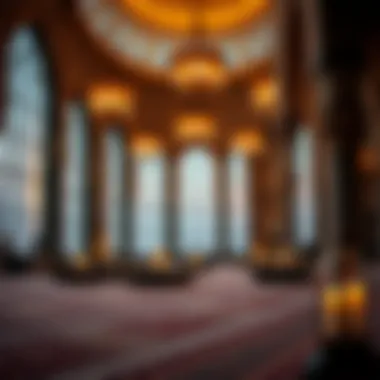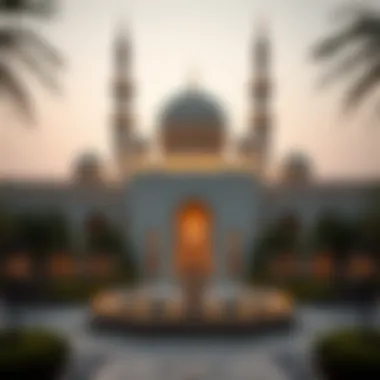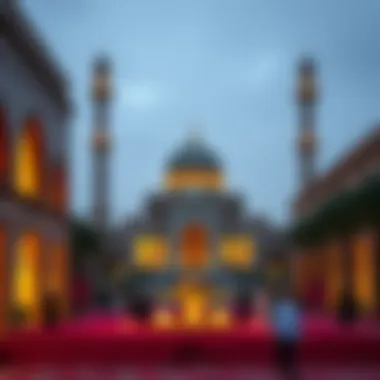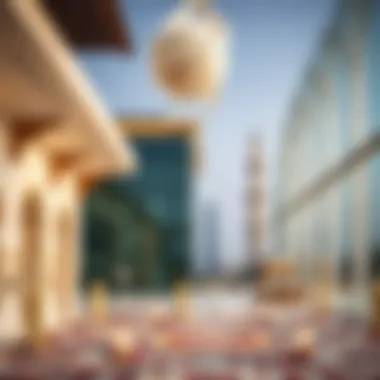Understanding Ramadan 2023: Observances in the UAE


Intro
Ramadan stands as a remarkable period in the calendar of Islamic culture, representing more than just a month of fasting. For many, it is a deeply spiritual time, a moment for reflection, community, and connection with the divine. In the United Arab Emirates (UAE), this month is embraced with unique traditions and customs that highlight its pivotal role in the lives of residents, expatriates, and investors alike. As 2023 approaches, anticipation builds around the exact start date of Ramadan, with many turning their attention to the implications it may have on various sectors, particularly real estate.
The UAE is a melting pot of cultures and nationalities, and the observance of Ramadan here exemplifies a blend of practices that vary from person to person. While it is predominantly practiced among Muslims, the spirit of Ramadan often extends beyond religious boundaries, influencing social norms, economic trends, and community dynamics. Understanding the nuances of Ramadan's observances provides valuable insight into how this month can shape the landscape, especially in bustling hubs like Dubai.
As we explore the start date and the intricacies of Ramadan 2023 in the UAE, it becomes apparent that being informed about local customs, behaviors, and economic shifts can be beneficial for anyone involved in the market—whether they are seasoned investors, aspiring homeowners, or curious expats. This comprehensive investigation will highlight key themes, including market trends and investment opportunities, showing how the essence of Ramadan permeates various aspects of life in the UAE.
Prologue to Ramadan
Ramadan holds a special place in the hearts of Muslims around the world, and its significance goes beyond mere rituals. This segment of the article provides an essential overview of Ramadan, focusing on its historical context and cultural importance in Islam. Understanding these elements is vital for anyone looking to gain insight into how this holy month shapes the daily lives of millions, especially in the UAE.
Historical Context of Ramadan
The origins of Ramadan trace back to the early days of Islam, with the month being linked to the revelation of the Quran to the Prophet Muhammad. According to Islamic belief, it was during this month that the first verses of the Quran were revealed to Muhammad, marking it as an extraordinary period of spiritual significance.
Historically, Ramadan has evolved into a time of fasting, prayer, and reflection. The fast begins at dawn and ends at sunset, promoting self-discipline and empathy for those less fortunate. The practice of fasting, or sawm, is one of the Five Pillars of Islam, highlighting its fundamental role in Islamic faith and practice.
Communities across the globe partake in various customs to honor the month, from nightly prayers and increased charity to community gatherings and special meals. In the UAE, the historical blend of Islamic traditions and local customs adds unique dimensions to how Ramadan is observed, making it an intricate tapestry of cultural practices.
Cultural Significance in Islam
The cultural significance of Ramadan extends beyond fasting. This month acts as a catalyst for enhanced spirituality and community engagement, encouraging Muslims to step outside themselves and consider the broader social landscape. During Ramadan, families often unite over the Iftar meal, breaking their fast together at sunset. This act fosters a strong sense of community and reinforces familial bonds.
Furthermore, it is a time for increased charitable actions. The practice of zakat, or almsgiving, which is also one of the Five Pillars, becomes especially pronounced during this month. Many Muslims allocate a portion of their wealth to support the less fortunate, embodying the spirit of compassion, generosity, and community welfare.
The vibrant customs surrounding Ramadan, such as decorating homes, preparing special dishes, and attending community prayers, reflect not only the spiritual but also the social dimensions of the month. Such observances contribute significantly to the richness of cultural identity in regions like the UAE, where secular and religious practices often merge beautifully.
In essence, understanding the essence of Ramadan is not just about recognizing its rituals; it's about grasping its historical roots and cultural depth, which profoundly influence people’s lives and communities throughout the UAE.
"Ramadan is not about just abstaining from food and drink but striving for a deeper connection with one's faith and community."
As this article delves further into Ramadan 2023, it will explore the expected start dates, observances, and the economic impact of this significant month. Through these discussions, we aim to provide investors, homeowners, and expatriates with a comprehensive perspective on how Ramadan shapes life in the UAE.
Ramadan 2023: Start Date in the UAE
Understanding when Ramadan begins is crucial, not just for those observing the fast but also for various sectors that feel the impact of this holy month. The anticipated start date of Ramadan 2023 is a pivotal aspect as it sets the tone for a month of fasting, spirituality, and community gatherings. In the UAE, a country with a diverse populace, the announcement of this date holds particular significance. It affects everything from daily routines to business operations, influencing local customs and the economy as a whole.


Expected Start Date
As per Islamic tradition, the start of Ramadan is determined by the sighting of the moon. For 2023, the month of Ramadan is projected to begin on the evening of March 22, with the first full day of fasting observed on March 23. However, it’s important to note that local mosques and religious authorities will confirm the exact date closer to the event, which may lead to differences in the start date across the region and even within various communities in the UAE.
This year, as per calculations, many Muslims in the UAE will likely gather for the Maghrib prayer on the night of March 22, breaking their fast with dates and water—a tradition that has been passed down through generations. Following this, morning prayer will precede the commencement of daily fasting until sunset.
Variability of the Moon Sightings
The variability of moon sightings plays a significant role in determining Ramadan's start and end dates. Islamic months are, in essence, lunar, making the actual sighting critical. In the UAE, this involves both scientific calculations and community practices, blending tradition with modernity.
- Practical Considerations: A clear sky can make the sighting easier, whereas cloudy conditions can lead to delayed announcements.
- Cultural Influence: Different city councils may have their own opinions, resulting in varying practices which could affect expatriate communities, leading to a blend of cultural celebrations.
The way Ramadan is ushered in varies not just by scientific methods but also by the local customs and community gatherings that bring people together, reflecting the rich tapestry of life in the UAE.
Observances and Practices during Ramadan
During the month of Ramadan, observances and practices take on a profound significance that permeates daily life in the UAE. This holy month, marked by fasting, prayer, and community gatherings, provides a unique opportunity for Muslims and non-Muslims alike to engage in cultural and spiritual reflections. Understanding these rituals not only enriches one’s experience of living in the UAE but also deepens one's appreciation for the intricate relationship between faith and daily life.
Fasting: Rules and Rituals
Fasting, known as Sawm, is one of the Five Pillars of Islam and holds a central place in Ramadan observances. From dawn until sunset, Muslims abstain from food, drink, and other physical needs, cultivating self-discipline and spiritual growth. The pre-dawn meal, called Suhoor, is significant as it prepares individuals for the day ahead. Meanwhile, the fast concludes with Iftar, a meal shared with family and friends that celebrates not only the end of the day’s fasting but also the bonds of community.
The rules surrounding fasting are precise; exceptions exist for individuals who might face hardship, such as the elderly, sick, or travelers. However, for many, adhering to the fast is viewed as a personal sacrifice and a way to purify the soul. In the UAE, one can feel the excitement in the air as mosques broadcast the call to prayer, marking the moment everyone can break their fast. In most vibrant cities, you’ll see streets filled with joy and gratitude, reflecting the essence of Ramadan.
Prayer and Spiritual Reflection
Spirituality reaches a peak during Ramadan, with an increased emphasis on prayer and reflection. Muslims are encouraged to engage in Tarawih prayers, special nightly prayers that take place after the obligatory Isha prayer. These prayers often involve reciting longer portions of the Qur'an, allowing for mindfulness and deeper contemplation.
Moreover, many families and individuals dedicate time for personal reflection and prayer throughout the day. A common practice is to turn off distractions such as television or social media and find a quiet place for introspection. This pursuit encourages one to reconnect with faith, seek forgiveness, and make resolutions for personal improvement. The atmosphere in the UAE becomes serene; it’s as if life slows down to create space for this spiritual surge.
Community Gatherings and Iftar Traditions
Community plays a pivotal role during Ramadan, particularly through the tradition of Iftar. Breaking fast together can be a lavish affair or a simple gathering, but the essence lies in sharing moments with others. In the UAE, you can find Iftar tents set up in public spaces, offering meals to those in need, fostering a spirit of unity and generosity.
Additionally, cafes and restaurants prepare special Iftar menus, reflecting the rich tapestry of Emirati cuisine. The inviting scents of dates, soups, and aromatic dishes often waft through the streets, luring community members to join together.
Iftar gatherings range from intimate home meals to larger communal events where people come together irrespective of their backgrounds. These gatherings serve as a reminder of compassion, empathy, and hospitality, fundamental values in Emirati society.
Unsurprisingly, these experiences remind residents and visitors alike that Ramadan is not just a time for fasting, but a festival of sharing.


In summary, the observances and practices during Ramadan shape not only individual experiences but also create a vibrant societal tapestry. Whether you are fasting, praying, or gathering with loved ones, the atmosphere in the UAE during this month paints a profound picture of faith, community, and shared values.
For further reading on Ramadan and its significance, explore resources on Britannica, or connect with local communities to understand the celebrations firsthand.
Economic Impact of Ramadan in the UAE
Ramadan not only carries religious significance, but it also has a profound economic influence, particularly in a vibrant economy like that of the UAE. During this holy month, various sectors witness notable shifts, affecting everything from retail to real estate. This impact is worth exploring, as it offers insights that assist investors, homeowners, expatriates, and renters in understanding market dynamics during this special period.
Changes in Consumer Behavior
As the crescent moon rises to mark the beginning of Ramadan, consumer behavior takes a notable turn. The retail sector sees a dramatic increase in activity, driven by cultural and religious obligations. Many families prepare for Iftar, the evening meal that breaks the fast, leading to a surge in demand for food and beverages. Grocery stores, particularly those selling dates, sweets, and traditional meals, often experience lines that stretch longer than the lines for a concert.
During this period, people shift their spending patterns. For example, while dining out slows down, purchases of home-cooked meal ingredients increase significantly. This change reflects a communal aspect of Ramadan, as families often gather to share meals. Market analysts note that retailers begin to provide promotions tailored to these cultural tendencies, thus capitalizing on the season's spirit.
"With Ramadan, it’s like a reset. You see people stock up, planning for weeks ahead. It's fascinating to watch the economy respond to cultural rhythms."
— Retail Economist, UAE
Influence on Real Estate and Market Dynamics
The real estate market also reflects the unique patterns of Ramadan. Investors and homeowners often reassess their priorities during this month. More specifically, the demand for properties near mosques or community centers can rise as families prefer to be close to places of worship.
Moreover, there's usually an uptick in short-term rentals, as expatriates may host friends and family who come for the month. Landlords often see an opportunity for higher returns through short-term rentals, driven by a surge in visitation. The real estate market can fluctuate, with locals looking for more spacious accommodations to host gatherings, reflecting the communal spirit of the month.
Special Offers and Promotions
Retailers and businesses prepare for Ramadan with special offers that entice shoppers during this period. From supermarkets to electronics stores, seasonal discounts often feature prominently in advertising. Businesses cordially ask for consumer attention, promoting discounts on bulk purchases, special Iftar deals, and limited-time offers.
- These promotions may include:
- Discounted meal plans at restaurants.
- Buy-one-get-one-free offers on dates and traditional desserts.
- Reduced prices on household goods that families may need during Ramadan.
This savvy approach goes beyond merely driving sales; it fosters a stronger connection between customers and businesses by illustrating a shared celebration of the holy month. Companies that effectively align their marketing strategies with cultural values not only enhance their bottom line but also build a loyal customer base that transcends Ramadan.
In summary, the economic impact of Ramadan in the UAE is multifaceted, with shifts in consumer behavior affecting various sectors. Real estate dynamics demonstrate how cultural trends can influence market decisions, while businesses embrace opportunities through tailored promotions. As a result, understanding these patterns becomes essential for investors, realtors, and residents alike.
Ramadan's Influence on Residential Life in Dubai
The impact of Ramadan on residential life in Dubai goes beyond mere traditions and rituals. It infiltrates various aspects of living, shaping the interactions between families and communities, while also dictating housing trends during this holy month. Understanding these influences is crucial, especially for investors, realtors, and expatriates who navigate the dynamic terrain of Dubai's housing market.


Housing Trends during Ramadan
During Ramadan, several notable trends emerge within the residential sector in Dubai. Firstly, there is often a rise in demand for larger properties that can accommodate families and gatherings. As families come together to break their fast, the need for dining space and community-friendly layouts becomes paramount. This has led to increased interest in villas and townhouses, which typically feature spacious kitchens and dining areas suitable for large Ifthar gatherings.
Additionally, rental prices can fluctuate during Ramadan, primarily due to the seasonal demand. Many landlords strategically adjust their rental agreements or offer short-term leases to cater to those looking for temporary housing solutions. This also includes expatriates who visit their families during this time, thus leading to an uptick in short-stay rentals.
Moreover, marketers in the real estate sector often create tailored promotional campaigns that align with the spirit of the month. Households may seek properties with amenities like communal prayer spaces or nearby mosques, making location a critical factor in residential decisions.
Family and Community Interactions
The essence of Ramadan is profoundly rooted in family and community, and this is vividly reflected in the residential life of Dubai. Families often engage more actively within their neighborhoods, organizing community events like Iftar gatherings or charitable functions. These initiatives not only foster a sense of belonging among residents but also enhance the appeal of certain neighborhoods for potential investors.
- Strengthening Bonds: Families that reside within close proximity tend to fortify their connections during Ramadan as they often share meals, prayers, and communal activities, creating a tight-knit environment.
- Cultural Exchange: Given Dubai’s vast expatriate community, Ramadan serves as a platform for cultural exchange. Communities come together to showcase their culinary traditions during Iftar, allowing diverse cultural practices to merge and flourish.
- Community Services: Neighborhoods may see enhanced community services like charity drives or food distribution to assist those in need, bringing residents closer together while also inviting contributions from local businesses.
As families gather and local traditions unfold, the atmosphere in residential areas changes, undeniably instilling a sense of unity and kinship among residents, regardless of their diverse backgrounds. Thus, recognizing this influence enables investors and homeowners to better appreciate the fabric of life in Dubai during this transformative month.
"Ramadan is not just about fasting. It’s about fostering community and strengthening bonds that sustain us all year long."
In sum, the influence of Ramadan on residential life in Dubai plays a pivotal role. The trends in housing demand and enriched community interactions are critical indicators for anyone looking to invest or live in this vibrant city, reminding us of the spirit of togetherness that embodies this holy month.
End: Embracing Ramadan's Essence
In considering the multi-faceted essence of Ramadan, particularly in the context of the UAE, one can't help but recognize its vibrant tapestry interwoven with threads of spirituality, communal ties, and socio-economic influences. This conclusion serves not only as a wrap-up but as a clarion call to appreciate Ramadan in its entirety.
As communities gather for Iftar, the act of breaking fast transcends mere nourishment; it morphs into a rich experience where bonds are strengthened, hearts are opened, and conversations blossom. It's a time when gleeful laughter mingles with reflective silence, when deep-seated traditions meet the fresh perspectives of burgeoning generations.
Reflection on Personal Growth and Community
Ramadan acts as a pivotal period for personal growth, both individually and within the community. Each day's fast offers a unique opportunity for self-reflection. Many find themselves pondering not only their own journeys but also the ways they can contribute to the greater good.
During this sacred time, people often engage in charitable acts, such as donating to local food banks or providing meals for those in need. Such efforts foster an environment where community spirit flourishes. Engaging with those outside one’s immediate social circle can lead to rewarding friendships and understanding.
"Ramadan isn’t just about abstaining from food and drink; it’s a vehicle for personal introspection and fostering connections."
Ramadan as a Catalyst for Change
Moreover, Ramadan encourages change, both personal and communal. It ignites a sense of urgency for many to reassess their lifestyles. Individuals may decide to pursue healthier eating habits or become more involved in their communities. The rituals of this holy month also encourage discussions about social responsibility. Many start to think about the disparities around them, leading to positive activism.
The impact of Ramadan can echo far beyond the month itself. Initiatives born from this reflective spirit can manifest in long-term outreach programs, sustainable projects, and continuous community engagements. By fostering a culture of giving, the foundations laid during Ramadan can yield benefits that resonate well past its conclusion, enhancing the social fabric of the UAE.
In summary, the essence of Ramadan lies in its ability to facilitate profound personal insights and broader community engagement. As we embrace the lessons and experiences it brings, we cultivate an enriching atmosphere where growth, compassion, and change flourish.
Relevant Resources
- Wikipedia on Ramadan
- Britannica on Ramadan Significance
- Qatar Foundation
- Ramadan and Charitable Initiatives



